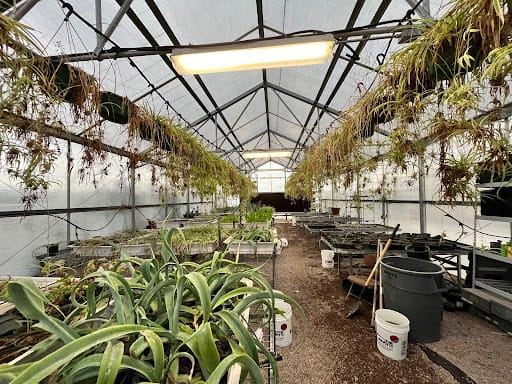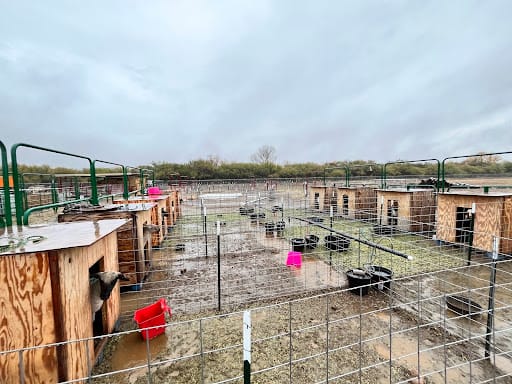
By Kaeleb Kramer, ASU sustainable food systems undergraduate student
During the winter break of 2023, I had the opportunity to visit my hometown, Rio Rico, Arizona, and explore the agricultural program at my former high school. Located just north of the US-Mexico border, the town plays a crucial role in receiving and distributing agricultural products through international ports, contributing to the broader supply chain in the United States. As an undergraduate college student studying sustainable food systems, my return to Rio Rico fostered a new appreciation for the agricultural community and the impactful work being undertaken to distribute food and cultivate the future leaders of agriculture.
Rio Rico High School, my alma mater, takes center stage as the primary high school in the region with prominent agriculture educational services. During my time there, I actively participated in various Career and Technical Education Programs (CTEs) that continue to thrive through a collaborative effort with Pima JTED, a public Career and Technical Education District that partners with businesses, industries, and 14 member public school districts to provide distinguished CTE programs. Notably, Richard McPherson continues to lead the Rio Rico Agriscience Program, maintaining its excellence just as it was during my attendance.
The Rio Rico Agriscience Program consists of a classroom within the high school and a small-scale demonstration farm located only a short distance away. The farm comprises fifty acres with plots for crops, two greenhouses for ornamental flowers and tomatoes, space for livestock, an infant permaculture fruit orchard, areas for welding and heavy machinery operations, and even a rudimentary aquaponics setup to grow herbs and select fruits. During my enrollment, I worked in the greenhouses and aquaponics setup in addition to tending to a flock of egg-laying hens and the two guardian dogs. Some of my duties included ensuring animal welfare, collecting and washing eggs for distribution, and harvesting floral plants and cherry tomatoes. Engaging in these activities provided me with valuable lessons in land and resource stewardship. This hands-on experience also allowed me to gain a comprehensive understanding of the day-to-day efforts and the broader operational aspects required to run a farm, even at a small scale.
These opportunities are tied to the school’s curriculum and paired with additional activities, such as Future Farmers of America (FFA) and 4-H, that engage students further. FFA, led by agricultural science educators and incorporated into classes, emphasizes professional career development. In contrast, 4-H is an extracurricular activity organized by local clubs and administered in the region by the University of Arizona's Cooperative Extension Service. These two groups meet annually at the Santa Cruz County Fair to showcase their livestock and submit projects. Every year, McPherson coaches his students within the FFA program in multiple district and state contests hosted by Arizona State University, Central Arizona College, and the University of Arizona. They compete in various events pertaining to agricultural sales, public speaking, floriculture, food science, agronomy, soil evaluation, entomology, and range management. For me, these competitions and showcases served as an important gateway to explore and consider areas of interest for future career paths.

I am very fortunate to have had these experiences provided to me during a pivotal stage of my development where it inspired my career trajectory and provided life lessons for the future. Before entering the Rio Rico Agriscience Program, my goal was to find a career pathway where I could utilize science and innovation to help others. Upon completion of the program, it was clear that this intersection was ever present through food and agriculture. The program not only gave support and insight into my trajectory but also affirmed my desire to find purpose through agriculture.
Through this opportunity and others like it, the integration of experiential learning in agriculture can convey practical knowledge and foster a lifelong feeling of responsibility, curiosity, and respect for the intricacies of food systems. It enables students to observe the direct connection between classroom concepts, food production, and the operation of agricultural systems. The knowledge and opportunities afforded to me should be extended to many more students, transcending urban and rural divides.
In the Phoenix metropolitan area, local organizations like Urban Farming Education and initiatives such as Garfield's Garden on the Corner exemplify diverse approaches to fostering community engagement through agriculture. These organizations not only construct community gardens but also contribute to education, ecotherapy, sustenance, and a sense of community. At the federal level, there is an exciting growing focus on expanding opportunities in agriculture education. For example, the USDA's Farm to School grants play a vital role in supporting farm-to-school initiatives, with federal lawmakers introducing bills like the Farm to School Act to enhance funding and aid for such programs.
Hands-on learning in agriculture should be a universal experience for students. The benefits, as evidenced by my own journey, underscore the importance of investing in such programs. These initiatives encourage students to consider their impact on the natural world from a young age, promoting healthier food choices and fostering a deep appreciation for agriculture's vital role in sustaining human life. In conclusion, experiential learning in agricultural settings provides K–12 students with a comprehensive and diverse educational opportunity that goes beyond conventional classroom instruction. It equips them with a holistic understanding of various disciplines, preparing them to succeed in their academic and career paths.